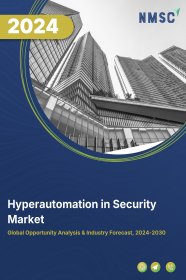
Hyperautomation in Security Market by Component (software and services), by Deployment Mode (On-Premise and Cloud), by Organization Size (SMEs and Large Enterprise), by Industry Vertical (IT & Telecom, BFSI, Healthcare, Retail & E-commerce, Government & Public sector, and Others)- Global Opportunity Analysis and Industry Forecast 2024-2030
US Tariff Impact on Hyperautomation in Security Market
Trump Tariffs Are Reshaping Global Business
Market Definition
The Hyperautomation in Security Market size was valued at USD 39.28 billion in 2023 and is predicted to reach USD 129.66 billion by 2030 with a CAGR of 18.60% from 2024-2030.
Hyperautomation in security refers to the integration of advanced automation technologies, such as artificial intelligence (AI), machine learning (ML), robotic process automation (RPA), and orchestration tools, to streamline and enhance security operations. It involves automating repetitive tasks, workflows, and decision-making processes across the entire security infrastructure, including threat detection, incident response, vulnerability management, and compliance monitoring. By leveraging hyperautomation, organizations can improve the efficiency, accuracy, and scalability of their security operations while reducing manual intervention and human error. Hyperautomation in security enables rapid threat detection and response, proactive risk mitigation, and continuous improvement of security posture in the face of evolving cyber threats.
Market Dynamics and Trends
Hyperautomation in security is being driven by the increasing frequency and complexity of cyber threats. With the rise in digital systems and networks, the risk of cyber-attacks has increased, leading to a need for more advanced security solutions. Hyperautomation enables organizations to automate and streamline their security processes, providing faster threat detection and response.
Moreover, the growing adoption of cloud-based services in various industries such as IT and telecom and e-commerce is driving the growth of hyperautomation in the security market. Hyperautomation enables organizations to automate their security processes, including monitoring, threat detection, and response, ensuring the security of their cloud-based systems. With the use of AI and machine learning, hyperautomation quickly detect and respond to security threats, providing faster response times and reducing the risk of data breaches.
Furthermore, the increasing regulatory compliance requirements in healthcare, finance, and government, is further boosting the growth of the hyperautomation in security market. Therefore, hyperautomation enables organizations meet these compliance requirements by automating security processes and ensuring that all security measures are up-to-date and properly implemented.
However, budget constraints and cost considerations hinder the growth of the hyperautomation in security market. Implementing hyperautomation solutions often requires significant upfront investments in technology infrastructure, software licenses, and professional services that restricts adoption of this technology.
On the other hand, the integration of new technologies such as quantum computing, blockchain technology, and edge computing in hyperautomation for more enhanced security operations is expected to create ample growth opportunities for the market in the future.
Market Segmentation and Scope of Study
The global Hyperautomation in security market is segmented on the basis of component, deployment mode, organization size, industry vertical, and geography. Based on component the market is divided into software and services. Software is further sub divided into, AI and ML, RPA, and others. Services are further sub divided into, consulting, and implementation & maintenance service. Based deployment mode the market is segmented into on-premise and cloud. Based on organization size SMEs and large enterprise. Based on industry vertical the market is divided into, IT & telecom, BFSI, healthcare, retail & e-commerce, government & public sector, and others. Geographical breakdown and analysis of each of the aforesaid classifications include regions comprising of North America, Europe, Asia-Pacific, and RoW.
Geographical Analysis
North America dominates the global hyperautomation in security market at present and is expected to remain dominant in the market throughout the forecast period. This is attributed to the rising adoption of hyperautomation by various companies in the North American region to automate the security processes, enabling quick detection and respond to threats, reducing the risk of data breaches is boosting the growth of the market.
For instance, in October 2020, UiPath, a Robotic Process Automation (RPA) software company, partnered with eSentire, a Managed Detection and Response (MDR) provider, to deliver the first of its kind end-to-end security policy automation across multiple Microsoft Security services. The partnership aims to automate security processes and accelerate incident response times by combining RPA technology with advanced threat intelligence.
Moreover, IT & telecom sector in North America has been undergoing significant digital transformation, which has further fuelled the adoption of hyperautomation in security market. According to International Trade Administration, the United States is the largest tech market in the world, accounting for one-third of the global information technology (IT) market, which is worth approximately USD 5 trillion. The integration of hyperautomation allows IT and telecom companies to streamline their security processes and respond more quickly to potential threats, enabling them to maintain the integrity and confidentiality of their data.
On the other hand, Asia-Pacific shows substantial growth in the hyperautomation in security market due to government initiatives including strengthening data privacy and security regulations related to AI and machines learning is further propelling the growth of the market in the region. Hyperautomation provides advanced security capabilities, including AI-based threat detection and response, enabling organizations comply with these new regulations and safeguard their data and systems.
For instance, in January 2022, China announces new AI governance initiatives to regulate and govern the development and use of artificial intelligence (AI) in the country. These initiatives include establishing a national AI governance committee to oversee the development and implementation of AI standards, promoting international cooperation in AI governance.
Also, the booming telecom industry in countries such as China and India is fueling the adoption of hyperautomation in the security market. With the increasing use of mobile devices and cloud-based services increases, telecom companies are facing security risks than ever before. Thus, to control these security risks telecom, several firms are adopting hyperautomation solutions to prevent and respond to security threats in real-time.
Competitive Landscape
Various market players operating in the hyperautomation in security market include IBM Corporation, Broadcom, Microsoft Corporation, Splunk Inc., Palo Alto Networks, Inc., McAfee LLC, Check Point Software Technologies Ltd., FireEye, Inc., RSA Security LLC, and Fortinet, Inc. among others. These market players are adopting various strategies such as product launches to maintain their dominance in the global hyperautomation in security market.
For instance, in March 2023, Microsoft launched "Security Copilot", an AI-powered security tool combining OpenAI's GPT-4 technology designed to support security teams investigate and respond to cyber threats more efficiently. The tool uses machine learning algorithms to identify anomalies in network activity, prioritize alerts, and recommend response actions based on the severity of the threat.
Also, in February 2023, IBM launched new security technology that utilizes an AI supercomputer enabling organizations to detect and respond to cyber threats. The AI supercomputer, called Vela, is designed to protect against cyberattacks and reduce the risk of data breaches by providing advanced threat detection and response capabilities through AI-powered anomaly detection and an automated response system that can take action in real-time.
Moreover, in February 2023, Check Point Software Technologies Ltd. launched check point inifinity spark, a threat prevention solution that delivers industry leading AI security and integrated connectivity to small and medium-sized businesses (SMBs). Infinity Spark offers enterprise grade security across networks, email, office, endpoint, and mobile devices also protecting SMBs against advanced threats including phishing, ransomware, credential theft and DNS attacks.
Key Benefits
-
The report provides quantitative analysis and estimations of the market from 2024 to 2030, which assists in identifying the prevailing market opportunities.
-
The study comprises a deep dive analysis of the hyperautomation in security market including the current and future trends to depict prevalent investment pockets in the market.
-
Information related to key drivers, restraints, and opportunities and their impact on the hyperautomation in security market is provided in the report.
-
Competitive analysis of the players, along with their market share is provided in the report.
-
SWOT analysis and Porters Five Forces model is elaborated in the study.
-
Value chain analysis in the market study provides a clear picture of roles of stakeholders.
Key Market Segments
By Component
-
Software
-
AI & ML
-
RPA
-
Others
-
-
Service
-
Consulting Service
-
Implementation & Maintenance Service
-
By Deployment Mode
-
On-Premise
-
Cloud
By Organization Size
-
SMEs
-
Large Enterprise
By Industry Vertical
-
IT & Telecom
-
BFSI
-
Healthcare
-
Retail & E-commerce
-
Government & Public sector
-
Others
By Region
-
North America
-
The U.S.
-
Canada
-
Mexico
-
-
Europe
-
The U.K.
-
Germany
-
France
-
Italy
-
Spain
-
Denmark
-
Netherlands
-
Finland
-
Sweden
-
Norway
-
Russia
-
Rest of Europe
-
-
Asia-Pacific
-
China
-
Japan
-
India
-
South Korea
-
Australia
-
Indonesia
-
Singapore
-
Taiwan
-
Thailand
-
Rest of Asia-Pacific
-
-
Rest of the World (RoW)
-
Latin America
-
Middle East
-
Africa
-
REPORT SCOPE AND SEGMENTATION:
|
Parameters |
Details |
|
Market Size in 2023 |
USD 39.28 Billion |
|
Revenue Forecast in 2030 |
USD 129.66 Billion |
|
Growth Rate |
CAGR of 18.60% from 2024 to 2030 |
|
Analysis Period |
2023–2030 |
|
Base Year Considered |
2023 |
|
Forecast Period |
2024–2030 |
|
Market Size Estimation |
Billion (USD) |
|
Growth Factors |
|
|
Countries Covered |
28 |
|
Companies Profiled |
10 |
|
Market Share |
Available for 10 companies |
|
Customization Scope |
Free customization (equivalent up to 80 working hours of analysts) after purchase. Addition or alteration to country, regional, and segment scope. |
|
Pricing and Purchase Options |
Avail customized purchase options to meet your exact research needs. |
KEY PLAYERS
-
IBM Corporation
-
Broadcom
-
Microsoft Corporation
-
Splunk Inc.
-
Palo Alto Networks, Inc.
-
McAfee LLC
-
Check Point Software Technologies Ltd.
-
FireEye Inc.
-
RSA Security LLC
-
Fortinet Inc.

















 Speak to Our Analyst
Speak to Our Analyst




















